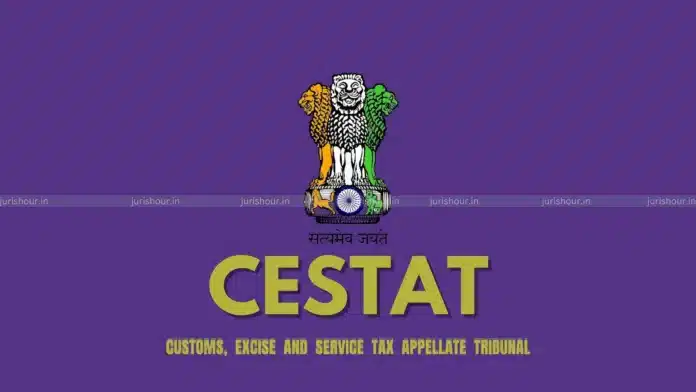The Mumbai Bench of Customs, Excise and Service Tax Appellate Tribunal (CESTAT) has held that 1 month’s statutory period notice to be given before issuing show cause notice (SCN) to customs officers.
The bench of C J Mathew (Technical Member) and Ajay Sharma (Judicial Member) has observed that original authority, with determination of absence of ‘good faith’ in acts of omission and commission on the part of the appellants, has skirted the template of section 155(2) of Customs Act, 1962 which lacks that motif.
The bench stated that the finding of the department is perverse for not only having invoked a test which is in the preserve of judiciary for acceptance of jurisdiction by evaluation of acts for ‘good faith’ at the threshold in suits, prosecution or other legal proceedings against Central Government, officers of the Government or local authorities but also by implicit acceptance of safeguards as extending to adjudications, by having ventured upon the test of ‘good faith’ even while avoiding the facts of the dispute necessary to decide the ingress of limitation.
The four individuals who were customs officers namely S/Shri Vinay Brij Singh, Jitendra Bahadur Singh Patel, CY Manikanhaiya and Azhiqussaman, are not among the aggrieved that are normally at the doors of the Tribunal.
Indeed, the shelter that they did ask for and the relief that, by these appeals, are sought have nothing to do with ‘personal penalty’ usually visited upon individuals of one sort or another; nor are these about the occasional individual fastened with liability to duties of customs.
On the contrary, neither has any penalty yet been imposed, nor is any duty liability going to be fastened, on them. All four are apprehensive that there is every possibility, or, more probably, all likelihood of, having to knock at the doors of the Tribunal someday.
Because, were this premonition but a figment of their imagination the adjudicating authority, who is yet to be, would not have turned down the plea of limitation, built into section 155 of Customs Act, 1962 and could have been resorted to, as bar to continuation of proceedings arising from notice proposing imposition of penalty under section 112 of Customs Act, 1962 on them.
And because, in the same vein, a conclusion was drawn, wrongly and on a plea not made, that the impugned activities could not be claimed as bona fide discharge of official duties.
The appellants are officers appointed by the Government of India—some even by the President. They belong to the following categories of customs officers under Section 3 of the Customs Act, 1962:
- (c) Principal Commissioners of Customs
- (d) Commissioners of Customs
- (e) Commissioners of Customs (Appeals)
- (f) Joint Commissioners of Customs
- (g) Deputy Commissioners of Customs
- (h) Assistant Commissioners of Customs
- (i) Other officers as appointed under this Act
These officers form the customs hierarchy. They are designated as “proper officers” under the Act, with powers at customs stations that include:
- Assessing import/export duties
- Clearing imported and exported goods
- Preventing entry of prohibited goods
- Recovering unpaid or underpaid duties
Some of these officers are now accused of being involved in violations that could lead to confiscation of others’ goods under Section 111 of the Customs Act, 1962.
However, the current appeals do not deal with proving those accusations. That will be decided later in adjudication. Right now, the dispute is only about whether continuing the proceedings is legally valid, especially regarding jurisdiction and limitation (i.e., whether the case is barred by law due to lack of authority or being too late).
The appellants also argue that Section 155 of the Customs Act protects officers from legal action if they acted in good faith:
Section 155 – Protection of actions under the Act
(1) No legal action (like a lawsuit or prosecution) can be taken against the government or its officers for anything done in good faith under the Act.
(2) Before starting any legal proceeding (other than a lawsuit), a written notice of one month must be given, and it must be initiated within three months of the event.
Whether or not this protection applies in the current case is not yet settled.
The appellant contended that acting in good faith was not relevant to section 155(2) of Customs Act, 1962. It was pointed out that other adjudicating authorities had been compliant with the procedural requirement as was seen in notice issued to an Inspector of Customs at Chandigarh.
The appellant contended that Section 155 provides legal protection to the Central Government, its officers, and local authorities for any act done or intended to be done in good faith under the provisions of the Act or its rules and regulations. It states that no suit, prosecution, or other legal proceedings can be initiated against them for such actions. Furthermore, if any legal proceeding other than a suit is to be initiated against the government or its officers for actions taken under this Act, the person must give a prior written notice of one month stating the intended action and its cause. Additionally, such proceedings must be initiated within three months from the date the cause arose.
The tribunal held that the findings in the order are set aside and the submission of the appellants, leading to the proceedings before us, are left open to enable fresh decision in resumed adjudication to be taken to logical conclusion for consideration of the safeguards claimed to have been breached.
Case Details
Case Title: Vinay Brij Singh Versus Commissioner of Customs (APSC)
Case No.: Customs Appeal No: 85945 Of 2020 With Cross-Objection No: 85419 Of 2020
Date: 24/03/2025
Counsel For Appellant: Dr. Sujay Kantawala, Vipin Jain
Counsel For Respondent: PRV Ramanan
Read More: Faridabad’s GST Fraud Case: Sessions Court Refuses Bail


